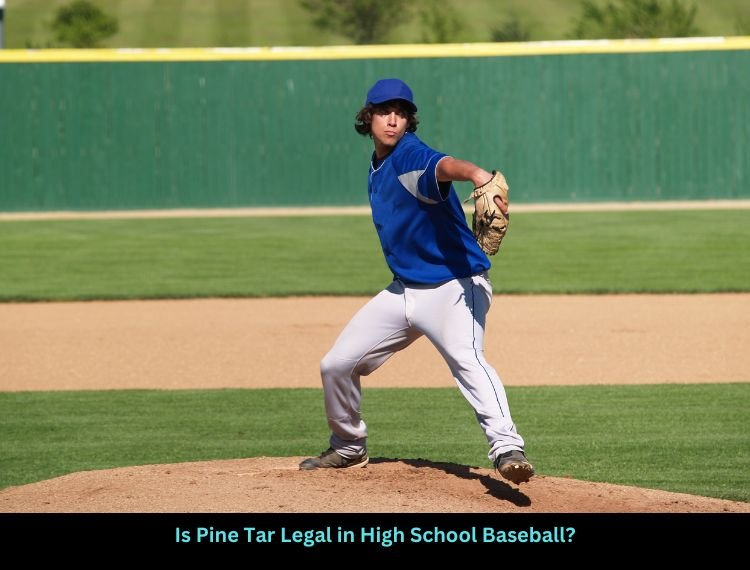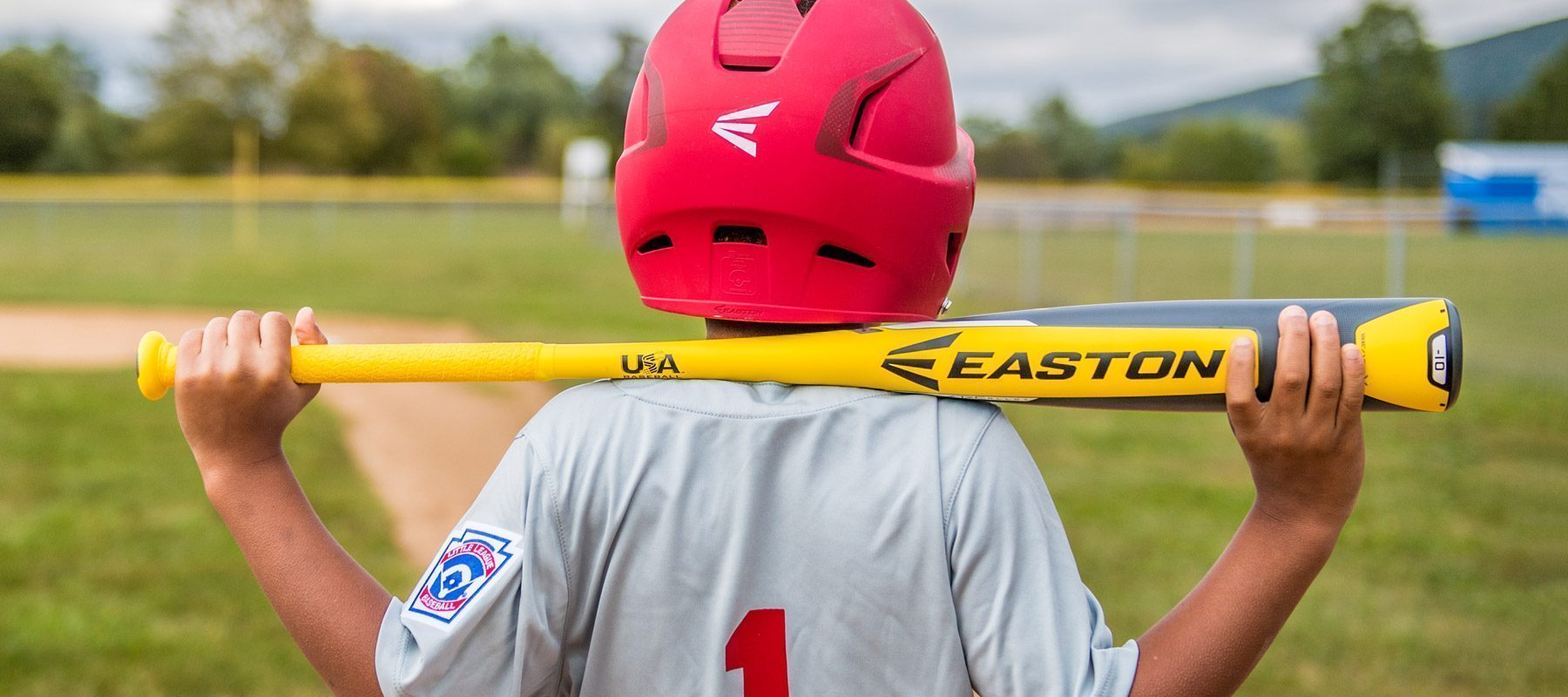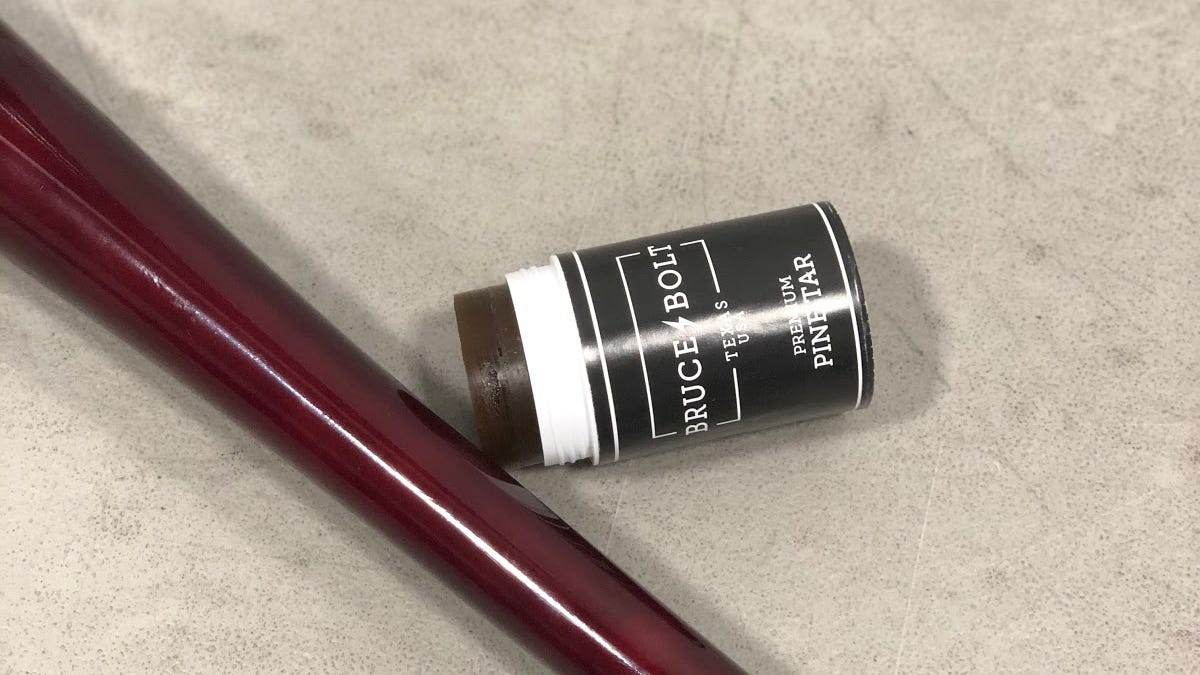Pine tar is not legal in high school baseball. Its use is prohibited by the National Federation of State High School Associations (NFHS).
Pine tar is often used in baseball to improve grip on the bat. Despite its advantages, the NFHS rules explicitly ban its use in high school games. Players caught using pine tar can face penalties, including ejection from the game.
This regulation aims to maintain a level playing field and ensure fair competition. Coaches and players must be aware of these rules to avoid any infractions. Understanding and adhering to these guidelines is crucial for all participants in high school baseball to ensure compliance and sportsmanship.

The Sticky Situation
Baseball has many rules. Some rules are about the tools players use. Pine tar is one such tool. This sticky substance helps players grip the bat. But is pine tar legal in high school baseball? Let’s explore this sticky situation.
Pine Tar Basics
Pine tar is a sticky substance. It comes from pine trees. Players use it for a better grip. This helps them hold the bat firmly. A good grip can help hit the ball well.
In professional baseball, there are rules. Pine tar can be used, but only in certain amounts. High school baseball has different rules. These rules can vary by state or league.
Historical Infamy
Pine tar has a famous history. In 1983, there was a big event. George Brett, a professional player, used too much pine tar. He hit a home run, but the other team complained. They said he broke the rules.
Officials measured the pine tar on his bat. They found too much pine tar. The home run was taken away. This event became known as the “Pine Tar Incident”. It showed how important the rules about pine tar are.
| Aspect | Details |
|---|---|
| What is Pine Tar? | A sticky substance from pine trees. |
| Purpose | Helps players grip the bat. |
| High School Rules | Vary by state or league. |
| Famous Event | The “Pine Tar Incident” in 1983. |
High School Baseball Regulations
Baseball is a popular sport in high schools. Each game follows strict rules. These rules keep the game fair. One important rule involves pine tar. Pine tar helps players grip the bat. But is it legal in high school baseball?
National Federation Of State High School Associations
The National Federation of State High School Associations (NFHS) sets the rules. These rules apply to all high school baseball games in the U.S. The NFHS bans pine tar on bats. Players cannot use pine tar to improve grip. This rule ensures fair play.
State-specific Amendments
Some states have their own rules. These rules may change the NFHS rules. Always check your state’s baseball regulations. Here is a table showing some state-specific rules on pine tar:
| State | Pine Tar Rules |
|---|---|
| California | No pine tar allowed on bats |
| Texas | Pine tar allowed only on handle |
| Florida | Follow NFHS rules, no pine tar |
To avoid penalties, know your state’s rules. Check with coaches or officials if unsure. Following these rules ensures everyone plays fairly.
Pine Tar And Equipment Rules
Pine tar is a sticky substance used by baseball players. It helps improve grip on the bat. But, its use in high school baseball has specific rules. Understanding these rules is crucial for both players and coaches.
Bat Guidelines
High school baseball bats must follow certain standards. The National Federation of State High School Associations (NFHS) sets these rules. Bats must be BBCOR certified. They should not exceed a length of 36 inches. The barrel should not be more than 2 5/8 inches in diameter.
Here are some key points:
- Bats must have the BBCOR stamp.
- Maximum length: 36 inches.
- Maximum barrel diameter: 2 5/8 inches.
Permissible Modifications
Players can make certain modifications to their bats. Pine tar can be used, but there are limits. The pine tar must not extend beyond 18 inches from the handle. Exceeding this limit can result in penalties.
Other permissible modifications include:
- Adding grip tape below the 18-inch mark.
- Using bat weights during practice.
Here is a quick table for easy reference:
| Modification | Details |
|---|---|
| Pine Tar | Up to 18 inches from the handle |
| Grip Tape | Below the 18-inch mark |
| Bat Weights | Allowed during practice |
Following these guidelines ensures fair play. It also keeps the game safe for all participants.
Legal Limits Of Pine Tar Usage
Pine tar is often used in baseball for better grip. But there are rules. High school baseball has strict limits on pine tar usage. Coaches, players, and parents should know these rules.
Application Boundaries
Pine tar can help players hold the bat. But there are limits. According to the National Federation of State High School Associations (NFHS), the pine tar on a bat cannot extend past 18 inches from the handle. This rule keeps the game fair.
| Rule | Description |
|---|---|
| Max Length | Pine tar must not exceed 18 inches from the handle |
Consequences Of Excess
Exceeding the pine tar limit has penalties. A bat with too much pine tar is illegal. The umpire will remove the bat from the game. The player using the bat may be out. This rule keeps the game balanced.
- Umpire removes illegal bat
- A player may be called out
Knowing the rules helps players avoid penalties. Always check your bat before the game.
Enforcement And Oversight
Pine tar use in high school baseball needs strict enforcement and oversight. This ensures fair play and safety. The governing bodies set the rules. But who enforces them? What are the penalties for non-compliance? Let’s explore these aspects.
Umpire’s Role
Umpires are the critical enforcers of pine tar rules. They inspect bats before the game. They check for illegal substances, like pine tar. If they find any, they can disqualify the bat. Umpires also monitor players during the game. They look for any suspicious behavior. If they see a player using pine tar, they can immediately act.
Penalties For Non-compliance
The penalties for using pine tar can be severe. Here are some possible consequences:
- Immediate ejection from the game
- Suspension for multiple games
- Team forfeits the game
- Possible fine for the school
Each league may have different penalties. It is important to know the rules. Players and coaches must stay informed. This helps avoid any unwanted penalties.
Credit: www.quora.com
Controversy And Fair Play
The use of pine tar in high school baseball has sparked debate. Many question its legality and impact on fair play. While some see it as a tool, others view it as an unfair advantage.
Competitive Advantage Debate
Pine tar can help players grip the bat better. This can improve their hitting performance. Some argue this gives users an unfair edge. Critics believe it disrupts the level playing field.
| Pros | Cons |
|---|---|
| Better grip | Unfair advantage |
| Improved performance | Violation of rules |
Ethics In Sportsmanship
Sportsmanship is key in high school baseball. Using pine tar raises ethical questions. Is it fair to use substances to boost performance? Many say it goes against the spirit of the game.
- Respect for opponents
- Following the rules
- Maintaining integrity
Coaches and players must consider these ethical points. The use of pine tar can affect the game’s integrity. Fair play should always be the priority.
Pine Tar Alternatives
Pine tar is a sticky substance that helps players better grip the bat. In high school baseball, pine tar is not always allowed. Players need alternatives to get a good grip on their bats. Here are some approved substances and innovations for grip enhancement.
Approved Substances
High school baseball has rules about what substances can be used on bats. Some substances are approved and safe for use:
- Rosin Bags: These bags contain a powder that keeps hands dry. Players use rosin bags to improve their grip without breaking the rules.
- Bat Wax: This product provides a better grip and is safe to use. Bat wax is easy to apply and works well.
- Grip Spray: This spray makes the bat stickier. It is legal and helps players hold the bat better.
Innovations In Grip Enhancement
New products are being developed to help players get a better grip. These innovations are changing the way players handle their bats:
- Bat Grips: These are special tapes that wrap around the bat handle. They provide a soft and sticky surface for better control.
- Liquid Chalk: This is a liquid that dries into a chalky substance. It keeps hands dry and improves grip.
- Batting Gloves: These gloves have sticky palms and fingers. They help players hold the bat more securely.
In the following table, you can see a quick comparison of these alternatives:
| Substance | Type | Ease of Use | Effectiveness |
|---|---|---|---|
| Rosin Bags | Powder | Easy | Moderate |
| Bat Wax | Wax | Easy | High |
| Grip Spray | Spray | Moderate | High |
| Bat Grips | Tape | Easy | High |
| Liquid Chalk | Liquid | Easy | Moderate |
| Batting Gloves | Gloves | Easy | High |

Credit: www.littleleague.org
Guidance For Coaches And Players
Understanding the rules around pine tar in high school baseball is crucial. This section provides essential guidance for coaches and players. It helps them stay compliant and informed.
Educational Resources
Coaches and players need access to accurate information. Here are some valuable resources:
- NFHS Rule Book: The National Federation of State High School Associations (NFHS) publishes the official rules. This book is a must-read.
- Local League Guidelines: Each league may have specific rules. Check with your local league for any variations.
- Online Workshops: Many organizations offer online courses about baseball rules. These can be very helpful.
Best Practices For Compliance
To ensure compliance, follow these best practices:
- Regular Rule Reviews: Review the NFHS Rule Book every season. Stay updated on any changes.
- Team Meetings: Hold regular team meetings to discuss rules. Make sure everyone understands the guidelines.
- Proper Equipment Checks: Check all equipment before games. Ensure no illegal substances, like pine tar, are used improperly.
- Clear Communication: Keep an open line of communication between coaches, players, and officials. This helps resolve any disputes quickly.
By following these steps, coaches and players can stay compliant. Ensuring fair play and adherence to rules is essential for a successful season.

Credit: www.baseballmonkey.com
Frequently Asked Questions
Can You Have Pine Tar On Your Bat In High School?
Yes, high school players can use pine tar on their bats. It must not extend past 18 inches from the handle.
Is Pine Tar Illegal In Youth Baseball?
Yes, pine tar is illegal in youth baseball. Using pine tar on bats or gloves is against the rules. Always check your league’s regulations.
What Is A Legal High School Baseball Bat?
A legal high school baseball bat must meet BBCOR standards, be aluminum or composite, and have a barrel diameter of 2 5/8 inches.
Conclusion
Determining pine tar’s legality in high school baseball is crucial for players and coaches. Always check your league’s specific rules. Staying informed ensures fair play and compliance. Follow regulations to avoid penalties and maintain the sport’s integrity. Remember, knowledge is key to a successful and enjoyable baseball experience.
